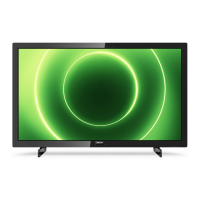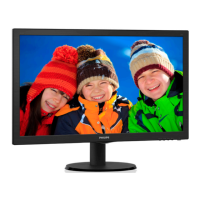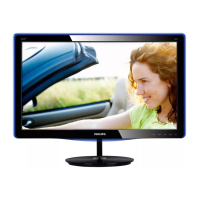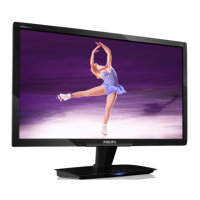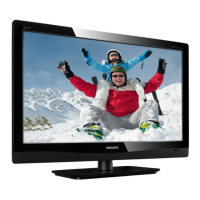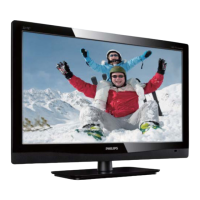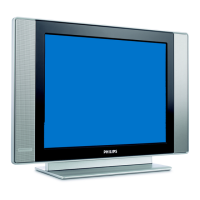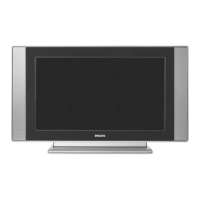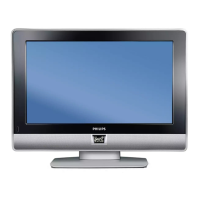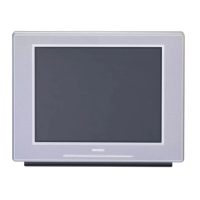Do you have a question about the Philips 24HFL3014 and is the answer not in the manual?
Explains advanced settings for professional TV control and functions.
Key safety instructions to read before operating the TV.
Instructions for attaching the TV stand and VESA wall mounting.
Detailed explanation of each button's function on the remote control.
Step-by-step guide for replacing batteries in the remote control.
Proper methods for cleaning the remote control without damage.
Procedures for turning the TV on, putting it in standby, and disconnecting power.
Basic TV operation using the physical joystick key on the TV unit.
Details on energy efficiency, power consumption, and product disposal.
Electrical specifications, ambient conditions, and power-saving options.
Technical details for TV signal reception, including tuner bands and input.
Information on the screen sizes offered for different TV models.
List of video and computer resolutions compatible with the TV.
Overview of all available input and output ports on the TV.
Physical measurements and weight for each TV model.
Details on speaker output, audio technologies, and sound outputs.
Guidelines for connecting external devices to the TV for optimal performance.
How to connect an antenna to the TV or set-top box.
Information on HDMI quality, ARC, and CEC (EasyLink) for device control.
Using a CAM module and smart card for premium encrypted TV channels.
How to turn the EasyLink feature on or off for device interaction.
Separately controlling EasyLink remote functionality for connected devices.
Steps to connect a digital receiver or set-top box to the TV.
How to connect HTS, including use of HDMI ARC for audio.
Instructions for connecting a Blu-ray disc player using an HDMI cable.
How to connect headphones to the TV's 3.5mm audio jack.
Guidelines for connecting USB flash drives to view media content.
How to connect a PC via HDMI or VGA for display on the TV.
Setting the TV for the best picture when connected to a computer.
Viewing photos, playing music, and videos stored on a USB device.
How to open video folders and play video content from USB.
Opening photo folders and displaying photos or creating slideshows.
Opening music folders and playing audio tracks from USB.
Controls for music playback, including shuffle, repeat, and favourites.
How to access and use the TV Guide for programme schedules and information.
Explanation of the main sections and layout of the TV's Home Screen.
Steps to open and navigate the primary TV interface.
Managing channel lists, radio stations, and tuning to channels.
Selecting and managing different input sources connected to the TV.
Accessing TV functions like guides, media browsing, timers, and alarms.
Overview of available TV settings for picture, sound, language, and more.
Introduction to the specific Home Screen interface for consumer models.
Instructions to open and use the consumer TV Home Screen.
How to select the menu language, audio, and subtitle preferences.
Procedures for searching, installing, and updating available TV channels.
Advanced settings for channel scanning, frequency, symbol rate, and reception tests.
Checking the quality of digital TV signals and fine-tuning.
Step-by-step guide for manually installing analogue TV channels.
Configuring TV system settings, including country and region selection.
Methods to find channels using automatic search or manual frequency entry.
Adjusting individual channel reception for optimal picture and sound.
Saving current channels or assigning new channel numbers.
Accessing settings like subtitles, status info, and clock while watching TV.
Enabling subtitles and selecting preferred language options.
Selecting input devices and renaming source icons for clarity.
Accessing TV guide, channel lists, and updating TV software.
How to use Quick Settings and the comprehensive All Settings menu.
Configuring picture styles, colour, contrast, sharpness, and brightness.
Fine-tuning picture settings like colour enhancement, gamma, and noise reduction.
Managing contrast modes, dynamic contrast, and video contrast levels.
Optimizing picture aspect ratio and screen edges for display.
Adjusting sound styles, bass, treble, surround sound, and headphone volume.
Adjusting sound settings based on whether the TV is on a stand or wall-mounted.
Fine-tuning audio features like auto volume, delta volume, and clear sound.
Settings for digital audio output formats, levelling, and delay synchronization.
Managing power saving settings, including energy level and auto-off timers.
Settings related to USB storage, CAM profiles, and network connections.
Connecting and operating HDMI CEC compatible devices with the TV remote.
Setting TV language, audio preferences, subtitle languages, and text options.
Choosing between Home and Shop modes to optimize TV settings.
Procedures for factory reset and full TV reinstallation.
Setting and correcting the TV clock automatically or manually.
Accessibility options for users with hearing or visual impairments.
Setting up PIN codes and parental ratings to restrict content access.
Setting or changing the PIN code for the Conditional Access Module.
Updating channel lists and performing complete channel re-installation.
Guide to updating the TV's system software using a USB memory device.
Information and offer to obtain source code for software packages used in the TV.
README document detailing software distribution under various open-source licenses.
Information on the FreeType font rendering library and its source.
Details on the OpenSSL toolkit for Transport Layer Security (TLS) and SSL protocols.
Information about the GNU C Library used in the TV's operating system.
Details on the c-ares library for asynchronous DNS requests.
Information on the SQLite embedded SQL database engine.
Details on the zlib library for general-purpose data compression.
Information on the curl utility used for transferring data.
Details on the GNU libiconv library for string conversion.
Information on the Cairo 2D graphics library for output devices.
Details on the libnl suite providing APIs for netlink protocol.
Information on the Advanced Linux Sound Architecture for audio and MIDI.
Details on the Libxml2 library for XML parsing and manipulation.
Information on the fontconfig library for managing font access.
Details on the neon library for HTTP and WebDAV client operations.
Information on ICU libraries providing Unicode and Globalization support.
Details on the Pixman library for low-level pixel manipulation.
Information on the Pango library for text layout and rendering.
Details on the GLib library providing core application building blocks.
Information on the DirectFB library for hardware graphics acceleration.
Accessing Philips online support, FAQs, software, and manuals.
How to contact consumer care for TV support and repair services.
Essential safety warnings covering electrical hazards, fire risks, and child safety.
Precautions regarding power voltage and proper connection to prevent TV damage.
Measures to prevent TV tip-over and ensure children's safety.
Warning about the danger of swallowing small remote control batteries.
Guidelines for ensuring adequate ventilation to prevent overheating.
Precautions to take when disconnecting the TV during thunderstorms.
Recommendations for avoiding hearing damage when using headphones.
Precautions for unpacking and connecting the TV in cold environments.
Advice on preventing condensation and its effects on the TV.
Instructions for safely cleaning and maintaining the TV screen's surface.
TV's compliance with relevant EU directives for safety and design.
TP Vision's adherence to electromagnetic field (EMF) safety standards.
Explanation of pixel behaviour and potential minor display imperfections.
Information on trademarks and logos associated with HDMI technology.
Details on Dolby Audio trademarks and copyright ownership.
Information regarding DTS patents and registered trademarks.
Acknowledgment of other registered and unregistered trademarks.
| Screen shape | Flat |
|---|---|
| Response time | - ms |
| Display diagonal | 32 \ |
| Display brightness | 250 cd/m² |
| Display resolution | 1366 x 768 pixels |
| Display technology | LED |
| LED backlighting type | Direct-LED |
| Display diagonal (metric) | 80 cm |
| Motion interpolation technology | - |
| 3D | No |
| Battery type | AAA |
| Clock function | Yes |
| Quantity per pack | 1 pc(s) |
| Cable lock slot type | Kensington |
| Annual energy consumption | 41 kWh |
| Number of batteries supported | 2 |
| AC input voltage | 220 - 240 V |
| AC input frequency | 50 - 60 Hz |
| Power consumption (off) | 0.3 W |
| Product color | Black |
| Panel mounting interface | 100 x 100 mm |
| Audio formats supported | AAC, MP3, WAV, WMA |
| Image formats supported | BMP, GIF, JPG, PNG |
| Video formats supported | AVI, MKV |
| Video compression formats | AVC, H.264, MPEG1, MPEG2, MPEG4, VC-1, VP9 |
| Subtitle formats supported | ASS, SMI, SRT, TXT |
| Cables included | AC |
| Operating temperature (T-T) | 0 - 40 °C |
| RMS rated power | 16 W |
| Programming period | 8 day(s) |
| Firmware upgradeable via | USB |
| Operating system installed | Not supported |
| HDMI version | 1.4 |
| Headphone outputs | 1 |
| RF connector type | IEC |
| USB 2.0 ports quantity | USB 2.0 ports have a data transmission speed of 480 Mbps, and are backwards compatible with USB 1.1 ports. You can connect all kinds of peripheral devices to them. |
| S-Video inputs quantity | 0 |
| Consumer Electronics Control (CEC) | EasyLink |
| Common interface Plus (CI+) version | 1.3.2 |
| Tuner type | Analog & digital |
| Analog signal format system | NTSC, PAL, SECAM |
| Digital signal format system | DVB-C, DVB-T, DVB-T2 |
| Harmonized System (HS) code | 85287280 |
| Depth (with stand) | 166 mm |
|---|---|
| Height (with stand) | 455 mm |
| Weight (with stand) | 4700 g |
| Depth (without stand) | 77 mm |
| Width (without stand) | 732 mm |
| Height (without stand) | 432 mm |
| Weight (without stand) | 4600 g |
